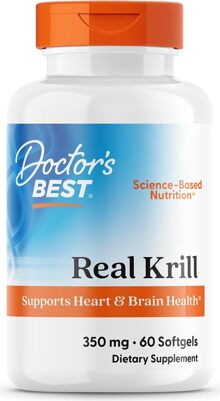
Doctor's Best Real Krill
Go to Store| Serving Size: 1 cap | ||
| Servings Per Container: 30 | ||
| Amount Per Serving | % DV * | |
| Antarctic Krill Oil Complex | ||
| Phospholipids, minimum | 140mg | |
| Omega-3 Fatty Acids | 80mg | |
| EPA(Eicosa Pentaenoic Acid) | 40mg | |
| DHA(Docosa Hexaenoic Acid) | 23mg | |
| Astaxanthin | 17mcg | |
|
* % Daily Value (DV) is based on a 2,000 calorie diet. Your daily values may be higher or lower based on your calorie needs.
† Daily Value (DV) not established. |
||
|
Other Ingredients: Softgel, capsule (gelatin, glycerin, purified water), vanillin. Not Suitable for Vegetarians. CONTAINS NOTHING OTHER THAN LISTED INGREDIENTS. May not be suitable for individuals with seafood allergies. |
||
|
Directions: Suggested Use: For maintenance, take 1 softgel per day, preferably with a small meal. To support mood management, take 2 softgels per day. To support blood lipid management, take 3 softgels per day. |
||
|
Warnings: *These statements have not been evaluated by the Food and Drug Administration. This product is not intended to diagnose, treat, cure, or prevent any disease. |
||
| Serving Size: 1 Softgel | ||
| Servings Per Container: 60 | ||
| Amount Per Serving | % DV * | |
| Antarctic Krill Oil 350 mg Complex, providing: | ||
| Phospholipids, minimum (min.) | 140mg | † |
| Omega 3 Fatty Acids, min. | 77mg | † |
| EPA (Eicosapentaenoic Acid), min. | 42mg | † |
| DHA (Docosahexaenoic acid), min. | 19mg | † |
| Astaxanthin, min | 28mcg | † |
|
* % Daily Value (DV) is based on a 2,000 calorie diet. Your daily values may be higher or lower based on your calorie needs.
† Daily Value (DV) not established. |
||
|
Other Ingredients: Softgel Capsule (Gelatin, , Glycerin, Purified Water), Vanillin. |
||
|
Directions: For maintenance, take 1 softgel per day, preferably with a small meal. To support healthy joint function, take 2 softgels daily, or as recommended by a nutritionally-informed physician. |
||

Doctor's Best Real Krill
Go to StoreBest Real Krill is a 100 percent authentic dietary supplement, a lipid nutrient complex sustainably harvested from the Antarctic Krill, Euphausia superba. Krill are shrimp-like ocean creatures (Crustaceans) that feed exclusively on algae, the primary producers in the marine food chain. Antarctic krill are so abundant they could be the largest single species mass on the planet.1
Krill thrive in the frigid Antarctic seas due to their ample content of the long-chain omega-3 fatty acids DHA (DocosaHexaenoic Acid) and EPA (EicosaPentaenoic Acid). By remaining fluid at temperatures way below freezing, these vital lipid nutrients assist krill to routinely survive, feed and reproduce.
Krill Oil’s Vital Lipids Offer A Range of Benefits*
Krill oil is sometimes compared to fish oil as an omega-3 dietary supplement. But authentic krill oil complex contains a greater range of nutrients, and its benefits far exceed those of fish oils. Most of the DHA and EPA of krill oil occurs linked into larger phospholipid molecules (pronounced fos-fo-lip-ids).2 These are preformed building blocks for the cell membranes that drive life processes. In fish oil, by contrast, all the DHA and EPA occurs as triglycerides, which are storage forms of fatty acids (“fat”). The DHA and EPA has to be removed from the triglycerides, then linked into phospholipids prior to inserting them into cell membranes.
Krill oil gets its red color from astaxanthin, a carotenoid nutrient. Astaxanthin is a potent membrane antioxidant and helps ensure krill oil’s exceptional shelf life stability.3 Fish oils lack astaxanthin and are vulnerable to premature rancidity—oxidative degradation of the fragile DHA and EPA molecules. Krill’s phospholipids, DHA, EPA, astaxanthin—all can be readily inserted into cell membranes.
Krill oil has produced impressive benefits in clinical trials, superior when compared against fish oil.*
Superior to Fish Oil for Premenstrual Challenges*
In a large proportion of women, premenstrual problems affect life quality by negatively affecting mood and other mental states and by generating discomfort. In a double blind trial, krill oil was compared against fish oil for reducing minor premenstrual complaints.4* Seventy (70) women of childbearing age consumed 2 grams of either a krill oil or a fish oil, daily for the first month. Then for the next 2 months, they took the assigned supplements for just eight days prior to menstruation and another 2 days subsequent, and filled in detailed questionnaires.
After the first 45 days the women taking krill oil had significant improvements in all 10 complaints, including irritability, gloom, stress, and “feelings of being overwhelmed.”4 The physical premenstrual complaints that improved included breast tenderness, weight gain, abdominal discomfort, swelling, and bloating.* Those taking fish oil reported improvements in just 2 physical complaints—weight gain and premenstrual abdominal discomfort. From day 45 to day 90 all the krill oil benefits were sustained while the fish oil group only received additional relief of swelling.*
The women taking krill oil also avoided the unpleasant reflux regurgitation experienced by two-thirds of the women who took the fish oil.
Superior Support for Blood Lipid Maintenance*
Maintaining healthy blood lipids is important not only for cardiovascular health, but also for maintaining memory with age.5,6 In a randomized clinical trial, 120 men and women received either krill oil, fish oil or a placebo for 90 days.7 The krill oil dosages ranged from 1-3 grams per day and were tailored to body mass index (BMI); the fish oil dosage was 3 grams per day. The trial went for 90 days.
Krill oil significantly elevated HDL cholesterol and supported cholesterol levels already in the normal range, at dosages of 1 gram and higher per day.7* Krill oil at 1 gram per day and higher also significantly promoted maintenance of healthy blood glucose.* The fish oil raised HDL cholesterol only marginally (by 4 percent).*
Support for Joint Health*
In a double blind trial, 90 subjects were randomized to receive either krill oil (300 mg per day) or a placebo.8They were assessed at baseline, then after 7, 14 and 30 days. By day 30, support for joint health was reported, versus no joint support in the placebo group.*
Krill’s Vital Lipids Build Cell Membranes, Support Cell Functions*
Every cell has a membrane system that performs most of the necessary life processes.9 Membranes are thin, interconnecting molecular sheets that define the cell’s outer border and extend into the cell interior. The membrane’s foundation or matrix consists mostly of phospholipids with fatty acids attached (DHA and EPA, for example). Numerous catalytic proteins are inserted into this matrix, and these must be free to move, which requires the matrix be semi-fluid. The omega-3 phospholipids of krill provide this natural fluidizing effect.*
For humans as well as for krill, omega-3 phospholipids are natural cell membrane fluidizers. They also drive metabolism: since fluidity facilitates the membrane proteins, the higher the omega-3 phospholipid content in a membrane the higher its metabolic activity.10 PhosphatidylCholine (PC) is the most common phospholipid in all human cells,9 and krill oil complex is an excellent dietary source of omega-3 PC carrying DHA and EPA.
Antarctic Krill Oil Complex, A Dietary Supplement Breakthrough
Fish stocks worldwide are threatened with depletion, due to unsustainable fishing practices.11 Krill stocks are not. A visionary international cooperation begun in 1982 continues to ensure that Antarctic krill harvesting remains sustainable. In that year the CCAMLR, the Convention on the Conservation of Antarctic Marine Living Resources, was founded as a multinational organization to exclusively set and regulate “precautionary” catch quotas for the krill and other Antarctic fisheries.12
Best Real Krill comes from Antarctic krill fished using proprietary eco-harvesting techniques. Developed in close cooperation with the World Wildlife Fund, these advanced techniques virtually eliminate “by-catch” problems, combat illegal fishing, and facilitate scientific documentation of the krill fishery. The post-catch krill processing is also a major advance, using a nontoxic solvent (ethanol) to help produce krill oil with the highest available levels of omega-3s and phospholipids, free of environmental chemical contamination.
Fish oils are a popular dietary supplement category, yet they do not predictably help maintain already healthy cholesterol levels,7 nor do they consistently benefit mood management as seen in the premenstrual trial.4Krill oil provides a broader spectrum of benefits than does fish oil, and at much lower daily intakes.*






